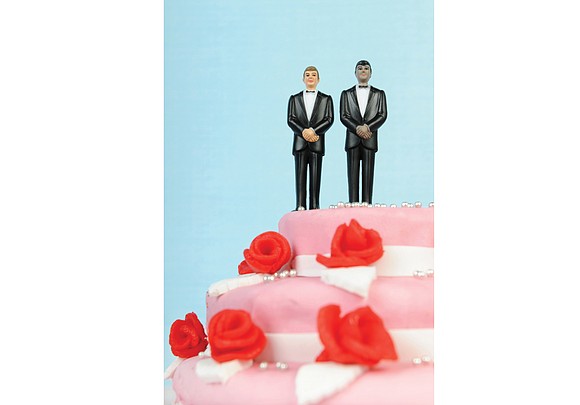Cake dispute turns into highly visible First Amendment religious football
10/6/2017, 11:31 a.m.
Religion News Service
Sometimes a wedding cake is just delicious. And sometimes it is a First Amendment football.
In the U.S. Supreme Court’s term that began Monday, the nation’s highest court will hear Masterpiece Cakeshop v. Colorado Civil Rights Commission, a.k.a. “The Cake Case.” It stems from 2012 when two gay men visited a Lakewood, Colo., bakery in search of a wedding cake. The owner-baker, who is Christian, turned them away. The case has been in court ever since.
What argument will each side make? Will this be another landmark decision? And when is a cake not just a decadent dessert, but an expression of deeply held religious beliefs?
The facts
In 2012, David Mullins and Charlie Craig, a Denver gay couple, wanted a wedding cake from Masterpiece Cakeshop. Owner and baker Jack Phillips refused, saying to do so would violate his deeply held Christian beliefs. The couple filed discrimination charges against Mr. Phillips and won before the Colorado Civil Rights Commission and in the state courts.
What will the baker argue?
Mr. Phillips’ lawyers have argued that two of his First Amendment rights — freedom of religion and freedom of expression — were violated. They lost. Pundits predict Mr. Phillips’ attorneys will emphasize the freedom of expression angle before the U.S. Supreme Court. They say this is because the expression argument — Mr. Phillips considers himself an artist who expresses himself through baked goods — is stronger than the religion argument.
To win under the religion argument, Mr. Phillips’ lawyers would have to prove that Colorado’s anti-discrimination laws are not religiously neutral — that they “burden” people of one particular faith. But the courts, in the past, have upheld those laws as neutral.
So the freedom of expression angle may be stronger. Mr. Phillips’ lawyers may argue his cakes are a form of art and art is a form of speech, so the law cannot compel him to make a speech — or a cake — supporting gay marriage.
David Cortman, one of Mr. Phillips’s lawyers, told The New York Times, “Every American should be free to choose which art they will create and which art they won’t create without fear of being unjustly punished by the government.”
What will the couple argue?
The couple’s lawyers don’t buy the cake-is-speech thing. They say Mr. Phillips is discriminating against them the way some businesses would discriminate against black people and other minorities, refusing to serve them or sell to them.
Who is going to win?
Some legal scholars say Mr. Phillips can take hope from the Supreme Court’s 2010 ruling in Citizens United v. Federal Election Commission, which established that corporations have free speech rights. There is long legal precedent that prohibits the government from compelling speech.
“It seems clear that a pro-life baker could not be forced by the state to provide a cake for a Planned Parenthood office party with the inscription ‘Pro-Choice,’ ” Eric Segall, a law professor at Georgia State University wrote on SCOTUSblog. “Whether Phillips’ wedding cakes are communicative enough to warrant similar protection, or whether Colorado’s interest in fighting discrimination against gays and lesbians is compelling enough to override that protection, are difficult questions, but they relate exclusively to free speech, not religion.”
The couple have precedents on their side, too. They highlight one 50-year-old case where a South Carolina restaurant argued it could turn away African-American customers because its owner had a religious objection to mixing races. The owner claimed its barbecue sauce was a form of artistic expression. He lost.
Former U.S. Solicitor General Gregory Garre commended Mr. Phillips’ lawyers for “an effective job of converting a gay marriage case into a test of free speech.”
“But on the other side,” he told NPR, “is a very exceptionally compelling narrative of our history as a society, the public accommodations law, sort of the crown jewels of the Supreme Court’s civil rights decisions.”
What to watch for?
All eyes should be on Justice Anthony Kennedy. At 81, Justice Kennedy is the longest serving, second oldest justice on the court and is a conservative — except when he’s not.
Justice Kennedy has sided with the court’s more liberal justices on several landmark cases, as he did in Obergefell v. Hodges, the 2015 decision that made same-sex marriage the law of the land. But he also sided with the conservative judges in Burwell v. Hobby Lobby, a ruling that the Christian-owned chain of craft stores could deny contraception coverage in its employee health care package.
Several of Justice Kennedy’s law clerks have speculated that he will soon retire and may be mindful of his legacy.
“This is a case where we are likely to have a court of one: Justice Kennedy,” Mr. Garre said.
The Supreme Court likely will hear oral arguments in The Cake Case in December and issue a decision by June.






